|
The rule that a conviction cannot be based on the statement of just one witness, is codified in article 342 of the Dutch Criminal Procedural Code. The Supreme Court has recently demanded that such a statement finds sufficient support in other evidence and that sometimes the trial judge needs to specify why that statement is corroborated enough by other evidence. However, the Supreme Court has always given a very marginal meaning to this rule, by allowing convictions which basically are substantiated by only that one statement. The evidence supporting the story of the witness does not have to prove that the crime actually took place, nor that is indeed the defendant who has committed it. In this article, I propose the replacement of the rule with a well-founded motivated ruling of the trial judge on this subject. |


PROCES
Meer op het gebied van Criminologie en veiligheid
Over dit tijdschriftMeld u zich hier aan voor de attendering op dit tijdschrift zodat u direct een mail ontvangt als er een nieuw digitaal nummer is verschenen en u de artikelen online kunt lezen.
| Redactioneel |
Toeristenbelasting voor staatshotels |
| Auteurs | Mr. drs. Sigrid van Wingerden |
| Auteursinformatie |
| Artikel |
Naar een vervanging van de unus-testisregel van artikel 342 lid 2 Sv |
| Trefwoorden | unus testis, bewijsmotivering, bewijsbeslissing, bewijsminimum |
| Auteurs | Mr. dr. Joost S. Nan |
| SamenvattingAuteursinformatie |
| Artikel |
De speelruimte van de strafrechterEen pleidooi voor een meer open en transparante opstelling |
| Trefwoorden | strafrecht, onpartijdigheid, rechter, wraking |
| Auteurs | Mr. Leonard de Weerd en Mr. Liza Stapel |
| SamenvattingAuteursinformatie |
|
A fair trial can only be guaranteed if a judge gives as much insight in his line of thinking as possible and if a judge is actively participating in finding the truth in a criminal case. According to statutes and case law a judge has a lot of freedom to show how he feels about certain things during criminal proceedings. A challenge to a judge shall not quickly be admissible. Still, a judge needs to be impartial and willing to review his preliminary decision/opinion. |
| Praktijk |
De taptolk en de Wet beëdigde tolken en vertalers – praktisch en effectief? |
| Auteurs | Mr. Rob van Noort |
| Auteursinformatie |
| Artikel |
Criminele bendes of hardwerkende arbeidsmigranten?Het mediadiscours ten aanzien van Midden- en Oost-Europeanen in Nederland |
| Trefwoorden | Midden- en Oost-Europeanen, media discoursanalyse, interviews, verhard klimaat |
| Auteurs | Flore van Rosmalen BSc en Anne van Es BSc |
| SamenvattingAuteursinformatie |
|
The population of Central and East European immigrants in the Netherlands has increased following the eastward expansion of the European Union. Over the past years, a lot of media and political attention seems to focus on problems with crime and disorder relating to this immigrant group. This article describes a two-step study on this matter. First, by undertaking a media discourse analysis, we assess to what extent we can speak of a ‘hardened climate’ regarding Central and East Europeans in the Netherlands between 2007 and 2013. Second, we have conducted qualitative interviews with Central and East Europeans in the Netherlands, to explore their perceptions of the Dutch media and political discourse. The results show that this group is often connected with crime and disorder in the media, and that many of our respondents experience this negative framing. Dangers of this trend regarding feelings of discrimination, scapegoating, and self-fulfilling prophecies, are discussed. |
| Artikel |
Straffen in soorten en matenDe ontwikkeling van de straftoemeting door de rechter in de periode 1995-2012 |
| Trefwoorden | straftoemeting rechter, decompositie strafpunten, omrekensleutel |
| Auteurs | Dr. Ben van Velthoven |
| SamenvattingAuteursinformatie |
|
This paper studies the development of the sentences that were imposed by criminal courts in the Netherlands over the period 1995-2012. Available data cover all principal sanctions: (unconditional) prison sentences, community service orders and fines. A decomposition is made to separate the gravity of sentencing (changes in the type and severity of the sanctions) from size effects (changes in the composition of the criminal cases dealt with). The gravity of sentencing is found to oscillate over the period 1995-2012. There is (as yet) no clear trend towards heavier sentencing, contrary to recent claims by Dutch judicial authorities. |
| Column |
Tussen familieband en toga-advies |
| Auteurs | Mr. Coosje Peterse |
| Auteursinformatie |
